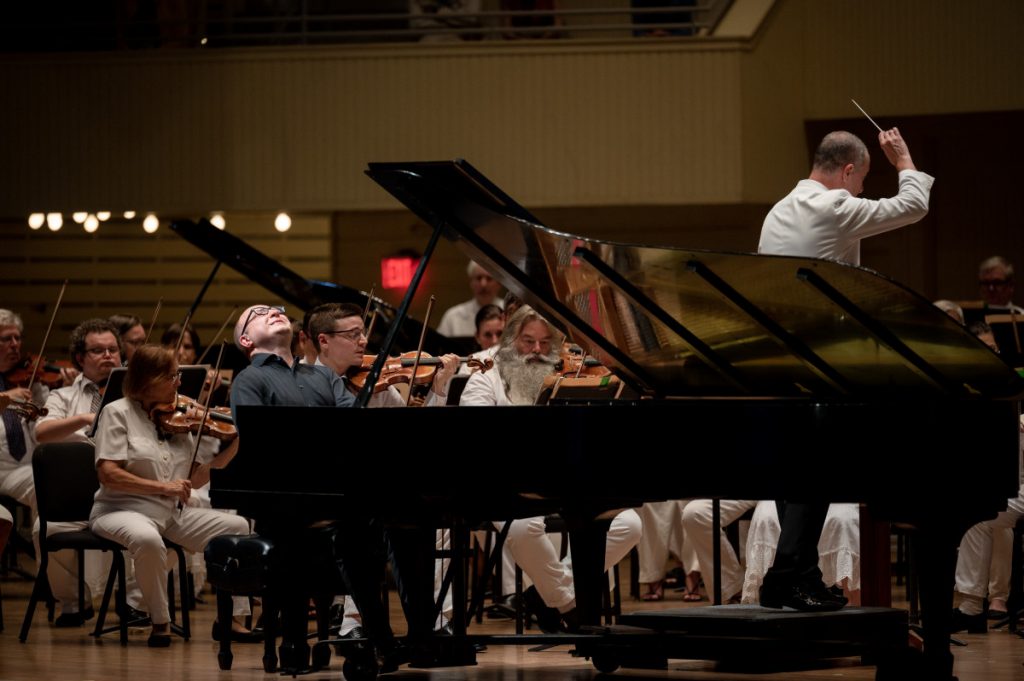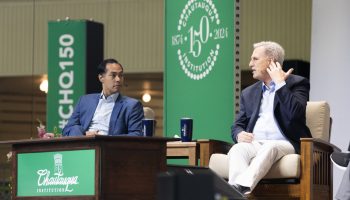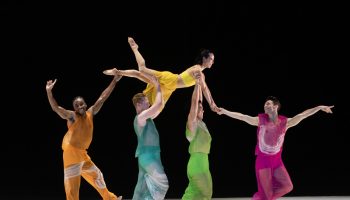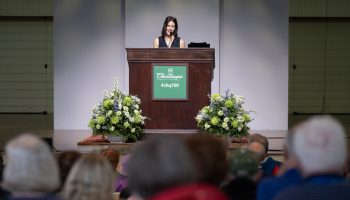
Zoe Kolenovsky
Staff writer
Pianist Alexander Gavrylyuk has developed a warm relationship with the Chautauqua Symphony Orchestra during the last 17 years of guest appearances.
“Playing with the Chautauqua Symphony is like playing with family members by now,” he said. “It’s really the most endearing, warm experience every time.”
In his second and final appearance on the Amphitheater stage this season, Gavrylyuk will be closing out his stay with a solo recital at 8:15 p.m. tonight in the Amp.
“I’m very happy to be back every year, very happy to be part of the Chautauqua society,” said Gavrylyuk, artist-in-residence and artistic adviser for the School of Music’s Piano Program.
When at Chautauqua, Gavrylyuk works closely with Program Chair Nikki Melville, a relationship that has flourished over the years.
“He’s just an outstanding role model for the students in terms of somebody that is a fabulous player, a famous player and a fabulous teacher,” she said.
His technical skills will be on display for the Chautauqua community this evening, with a performance that begins with Franz Joseph Haydn’s Sonata No. 47 in B Minor, Op. 14, No. 6.
“This is a very theatrical work. It’s quite bright in terms of its range of expressions,” said Gavrylyuk. “There’s all kinds of operatic drama and expressions of joy and passion and purity, and lots of humor as well.”
This will be followed by a series of Chopin’s greatest works: two Etudes and his Fantasie in F Minor.
Gavrylyuk said Fantasie is “very wise in a way because it’s already Opus 39. So he was quite a bit older at that stage compared to the Etudes, which were written in Opus 10.”
The piece is very intense thematically, with Gavrylyuk describing it as bittersweet.
“We hear these joyful moments of an absolutely outgoing sense of joy and love, and also at the same time there’s tormented feelings of this piece as well. There’s sort of a sense of fate above all of those,” he said.
That concludes the first half of the concert, which will continue after an intermission with the full selection of movements from Russian composer Modest Mussorgsky’s Pictures at an Exhibition.
“It’s a work which really explores human expression in such a variety of characters, of tone, colors, and visions,” Gavrylyuk said.
While the audience is most likely to be familiar with the final movement, “The Great Gate of Kiev,” Gavrylyuk said each of the work’s elements is engaging.
“It’s so powerful; there are so many fireworks in there,” he said.
Gavrylyuk is internationally renowned for his performances in concert, having performed as a soloist and with orchestras to critical acclaim. The Ukrainian pianist began his studies at age 7 in Australia, where he grew up, and progressed rapidly.
He took first prize in the 1999 Horowitz International Piano Competition and the 2000 Hamamatsu International Piano Competition at ages 15 and 16, later receiving a gold medal at the Arthur Rubinstein International Piano Masters Competition in 2005.
He has participated in music festivals around the world, notably in New York City, Rotterdam and Los Angeles, and his numerous solo recordings over the years have been widely praised.
In addition to his performing obligations, Gavrylyuk is involved with much of the Chautauqua School of Music’s Piano Program, teaching lessons and holding discussions during his stay.
“I’m bringing my experience as a concert musician to the students in different forms. … I can offer a lot of what I’ve experienced on stages for the last 25 years,” he said.
Gavrylyuk taught a master class with a number of the students last Friday, which he said is one of his favorite parts of his partnership with the program.
“It’s sharing and working through different musical ideas together with the students, which to me personally is the most humbling and enriching kind of experience,” he said. “I’m much more in favor of a mutual kind of process rather than the hierarchical type of teacher-student setup. I much prefer to have the kind of mental approach of camaraderie and friendship.
The night is sure to be a joyous one in the Amp, and Gavrylyuk said he is grateful for each chance to perform on the grounds.
“The philosophy of Chautauqua aligns with my own vision for the arts,” he said. “I get very inspired by being here because I meet people that share this point of view, and they share the passion for learning, the passion for sharing, the passion for art and for this universal language that music presents us with.”
Gavrylyuk said he enjoys the balance of learning and “feeling of zen” that lends itself to open-mindedness.
“Those things coming together for me,” he said, “it’s like a piece of heaven.”




